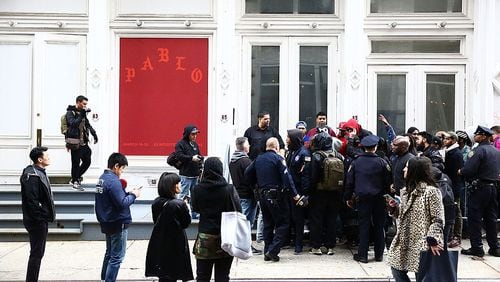It was almost a year ago when lines simultaneously formed in 21 cities around the world from Berlin to Bondi Beach (and at Atlanta's Lenox Square) for the opening of Kanye West's Life of Pablo pop-up shops.
The rapper-turned-designer set up three-day long, mini boutiques offering a range of merchandise in advance of his tour of the same name. The shops, all similar, featured t-shirts, caps and jackets with Pablo-esque designs. According to reports in Billboard magazine, it proved to be a lucrative venture. The New York City store alone raked in $1 million over two days .
West has been credited with setting the standard for the pop-up shop model in the music industry -- an increasingly popular way for musicians to sell branded merchandise and create an experience for fans -- which has been employed by artists ranging from Drake to Metallica.
While the pop-ups are most certainly about making money (no one would do them if they didn't), music industry experts said it is also about artists creating a unique experience and a real connection to fans.
"The entire industry has been forced to transform and when you look at the traditional model being usurped by online and downloaded music, why can’t the concert experience also be disrupted?" said Bronwyn Morgan, Atlanta-based CEO of Subkulture Innovation, which help companies across various industries future proof and prevent disruption.
With music becoming increasingly digital, artists such as Big Sean, Guns N' Roses and Lady Gaga are turning to pop-ups as a way to control the experience with their fans and recapture some of the lost intimacy of music.
West's international pop-ups were produced in conjunction with Bravado, a subsidiary of Universal Music Group which produces and markets merchandise for various musicians
The company CEO, Mat Vlasic, said pop-ups are great marketing for any musician, but it has to be about more than the merchandise.
"It's great marketing for the upcoming tour,' said Vlasic in an interview with Vogue magazine about the Life of Pablo pop-ups , "But I think it was a great way for fans of Kanye West to experience his music, his style, his creative energy, in a space that he curated and the ability to buy into his world."
Vlasic compared the pop-up experience to the vibe of record stores from the 70s and 80s, the decades that preceded the boom in CDs which marked the beginning of a change in the way we shop for music.
Earlier this month, Metallica hosted a pop-up at Atlantic Station in advance of their concert at Sun Trust park on July 9.
Their WorldWired tour shop featured exclusive products including coolers and NFL-compliant clear bags with Metallica logos as well as collectibles such as live recordings from New York's Webster Hall on vinyl.
A week later, on July 17, Kendrick Lamar rolled into town for a concert at Infinite Energy Arena. The day kicked off with a pop-up shop in Downtown Atlanta offering hoodies, T-shirts, caps and other exclusive merchandise priced from $30-$60.
While many Atlanta-based fans were excited to score merchandise, just as many were likely there in the hopes that Lamar would pop-up at his pop-up as he did during the inaugural store experience in Dallas.
Some fans who turn out for the pre-concert pop-up shops may have tickets to attend the concert or tour, but that isn't always the case, said Morgan. The pop-ups may be the only point of contact an artist has with a fan.
"With the entertainment industry being what it is and artists who are the brand, a pop-up shop gives the chance to reach people who may not be able to come to the concert," Morgan said.
Yes, artists will make money on touring and selling merchandise, she said, but pop-up shops offer a level of intimacy and social engagement that artists are desperately seeking in a rapidly changing industry.
"This is the beginning of an evolution, so I think we will see more of that especially with the integration of virtual reality and augmented reality where you can engage with the things you love," Morgan said.







